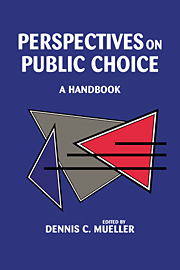Book contents
- Frontmatter
- Contents
- Preface
- Contributors
- 1 Public choice in perspective
- Part I The need for and forms of cooperation
- Part II Voting rules and preference aggregation
- Part III Electoral politics
- Part IV Individual behavior and collective action
- Part V Public choice in action
- 20 Modern bureaucratic theory
- 21 The positive theory of public bureaucracy
- 22 The political economy of taxation
- 23 Rent seeking
- 24 Endogenous protection: The empirical evidence
- 25 Why does government's share of national income grow? An assessment of the recent literature on the U.S. experience
- References
- Name index
- Subject index
23 - Rent seeking
Published online by Cambridge University Press: 04 May 2010
- Frontmatter
- Contents
- Preface
- Contributors
- 1 Public choice in perspective
- Part I The need for and forms of cooperation
- Part II Voting rules and preference aggregation
- Part III Electoral politics
- Part IV Individual behavior and collective action
- Part V Public choice in action
- 20 Modern bureaucratic theory
- 21 The positive theory of public bureaucracy
- 22 The political economy of taxation
- 23 Rent seeking
- 24 Endogenous protection: The empirical evidence
- 25 Why does government's share of national income grow? An assessment of the recent literature on the U.S. experience
- References
- Name index
- Subject index
Summary
Rent seeking is the socially costly pursuit of wealth transfers. The concept of rent seeking was introduced to the economics profession by Tullock (1967). In his original presentation the basic idea that transfer seeking could lead to social costs was so simple that it has been automatically assumed that the idea had to have clear precursors in the literature. Nonetheless, even though one can find vague resemblances to the idea in many earlier writings, no one has uncovered a forerunner to Tullock's idea. His 1967 paper represents an original and important development in economic theory.
The early doctrinal development of the theory of rent seeking proceeded as follows. Krueger (1974) gave the field a name in her paper “The Political Economy of the Rent-Seeking Society.” For better or worse this terminology has stuck. Bhagwati (1980, 1982) has persisted in an attempt to rename the field Directly Unproductive Profit Seeking (DUP), but the term “rent seeking” seems to have carried the day. Although she presented some empirical estimates of the costs of rent seeking, Krueger's paper was primarily theoretical in nature, showing how rent seeking can lead to social costs in the adoption of policies to restrict international trade. Krueger was unaware of Tullock's paper. Posner (1975), who was aware of Tullock's paper, wrote the first empirical paper about rent seeking. His estimates suggested that the social costs of rent seeking in the regulated sector of the U.S. economy could be substantial. Cowling and Mueller (1978) presented estimates of the welfare loss from monopoly power in the United States and United Kingdom, which included calculations of costs associated with rent seeking.
- Type
- Chapter
- Information
- Perspectives on Public ChoiceA Handbook, pp. 506 - 525Publisher: Cambridge University PressPrint publication year: 1996
- 13
- Cited by



